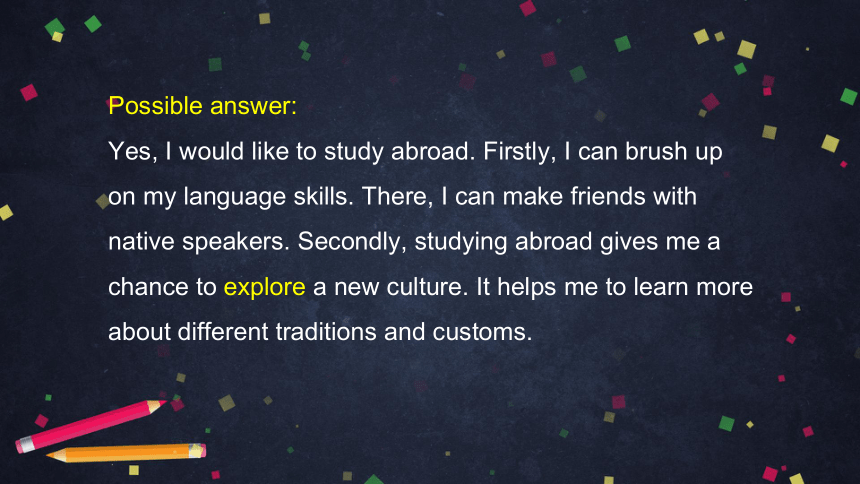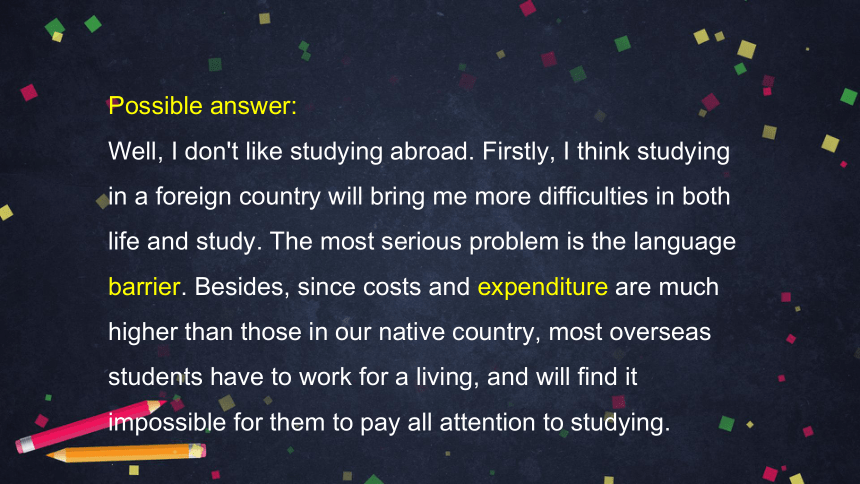高中英语北师版必修三 Unit 9 Learning (9) 课件(64张ppt)
文档属性
| 名称 | 高中英语北师版必修三 Unit 9 Learning (9) 课件(64张ppt) |  | |
| 格式 | zip | ||
| 文件大小 | 2.6MB | ||
| 资源类型 | 教案 | ||
| 版本资源 | 北师大版(2019) | ||
| 科目 | 英语 | ||
| 更新时间 | 2020-06-28 15:41:17 | ||
图片预览












文档简介
(共64张PPT)
必修三
Unit
9
Learning
(9)
高一年级
英语
Reading
Club
1
Studying
Abroad
Lead
in
Have
you
ever
thought
about
studying
abroad?
And
why?
Possible
answer:
Yes,
I
would
like
to
study
abroad.
Firstly,
I
can
brush
up
on
my
language
skills.
There,
I
can
make
friends
with
native
speakers.
Secondly,
studying
abroad
gives
me
a
chance
to
explore
a
new
culture.
It
helps
me
to
learn
more
about
different
traditions
and
customs.
Possible
answer:
Well,
I
don't
like
studying
abroad.
Firstly,
I
think
studying
in
a
foreign
country
will
bring
me
more
difficulties
in
both
life
and
study.
The
most
serious
problem
is
the
language
barrier.
Besides,
since
costs
and
expenditure
are
much
higher
than
those
in
our
native
country,
most
overseas
students
have
to
work
for
a
living,
and
will
find
it
impossible
for
them
to
pay
all
attention
to
studying.
advantages:
improve
one's
language
skills
develop
self-independence
broaden
one's
horizons
enjoy
a
good
academic
environment
sharpen
one's
edge
have
a
brighter
future
disadvantages:
high
costs
language
barrier
homesickness
safety
problems
eating
habits
lack
of
self-control
Which
country
do
you
want
to
study
in?
And
Why?
the
United
States
the
United
Kingdom
France
Italy
Germany
Brazil
Canada
New
Zealand
Australia
Possible
answer:
If
I
have
a
chance
to
study
abroad,
I
will
choose
the
UK.
There
are
many
prestigious
universities
in
the
UK,
such
as
the
University
of
Cambridge,
the
University
of
Oxford
and
so
on.
I
can
improve
my
academic
performance
there.
Besides,
I’m
interested
in
the
tourist
attractions
in
the
UK,
like
Big
Ben,
the
London
Eye
and
Tower
Bridge.
respected
and
admired
as
very
important
or
of
very
high
quality
What
problems
or
difficulties
will
you
meet
when
you
study
in
foreign
countries?
Possible
answer:
Well,
maybe
I
am
not
used
to
the
food
there.
Chinese
people
prefer
cooked
food
while
Americans
are
fond
of
uncooked
food
which
I
don’t
like.
Possible
answer:
As
far
as
I
am
concerned,
making
friends
is
not
very
easy
in
western
countries
because
we
share
different
cultures
and
values.
So
it
is
difficult
to
have
smooth
conversations
as
we
are
not
familiar
with
each
other’s
cultures.
The?values?of
a
person
or
group
are
the
moral
principles
and
beliefs
that
they
think
are
important.
Now,
let’s
read
three
passages
about
Chinese
students
studying
abroad
and
find
out
what
problems
they
met
there.
“I’ve
found
it
difficult
to
make
friends
here.
The
Australian
students
seem
friendly,
but
they
only
talk
about
things
which
I
find
boring,
like
football
and
surfing.
I
like
to
talk
about
C-pop,
but
I
haven’t
found
anyone
local
who
shares
that
interest.
Actually,
I’ve
noticed
that
a
lot
of
Chinese
students
seem
to
only
spend
time
with
their
Chinese
friends.”
Liu
Bao
“I
like
many
things
about
American
culture,
but
I
don’t
like
American
food.
At
first,
I
had
cornflakes
for
breakfast,
a
hamburger
for
lunch,
and
pizza
for
dinner.
The
food
tasted
good,
but
after
a
couple
of
days,
I
felt
sick.
Now
I
cook
at
home
or
have
dinner
in
a
local
Chinese
restaurant.”
Li
Ni
“The
teachers
here
in
the
UK
are
great.
My
maths
teacher
says
I’m
his
best
student
and
I’m
learning
a
lot.
But
some
subjects
are
very
difficult
because
I
have
to
read
and
write
in
English.
There
are
also
a
lot
of
discussions
and
debates
in
class,
and
our
teachers
expect
us
to
ask
questions
about
what
we’re
learning.
My
spoken
English
is
improving,
but
I
still
feel
quite
shy
sometimes.”
Chen
Xin
What
problems
did
they
meet
in
foreign
countries?
friendship
food
language
Now,
let’s
draw
a
brief
mind
map
to
show
the
topic
mentioned
in
each
passage.
Chinese
students
studying
abroad
friendship
food
language
Next,
let’s
read
the
three
passages
again
and
fill
in
the
blanks.
student
aspect
details
Liu
Bao
in
Australia
friendship
It
is
_______
to
make
friends
here
because
the
Australian
students
like
to
talk
about
________
and
_____
while
I
prefer
_______.
difficult
football
surfing
C-pop
friendship
The
Australian
students
football
surfing
Liu
Bao
C-pop
Chinese
students
studying
abroad
What
do
you
like
talking
about
with
your
friends
in
spare
time?
reading
TV
series
movies
…
student
aspect
details
Li
Ni
in
America
food
At
first,
I
had
_________
for
breakfast,
___________
for
lunch,
and
_______
for
dinner.
Now
I
______
at
home
or
eat
in
a
________
Chinese
restaurant.
cornflakes
a
hamburger
pizza
cook
local
Why
does
Li
Ni
cook
at
home
or
have
dinner
in
a
local
Chinese
restaurant?
Because
after
a
couple
of
days,
Li
Ni
felt
sick
of
American
food.
food
American
food
cornflakes
hamburgers
Li
Ni
cook
Chinese
students
studying
abroad
pizza
restaurant
student
aspect
details
Chen
Xin
in
the
UK
language
Some
subjects
are
difficult
because
I
have
to
read
or
write
in
________.
My
_______
English
is
improving
but
I
still
feel
_______
to
take
part
in
________
and
_______
in
class.
English
spoken
shy
discussions
debates
language
British
students
native
speakers
confident
Chen
Xin
shy
Chinese
students
studying
abroad
a
foreigner
Culture
shock
Culture
shock
was
introduced
for
the
first
time
in
1958
to
describe
the
anxiety
produced
when
a
person
moves
to
a
completely
new
environment.
??
This
term
expresses
the
lack
of
direction,
the
feeling
of
not
knowing
what
to
do
or
how
to
do
things
in
a
new
environment,
and
not
knowing
what
is
proper
or
improper.
the
state
of
feeling
nervous
or
worried
Culture
shock
The
feeling
of
culture
shock
generally
sets
in
after
the
first
few
weeks
after
coming
to
a
new
place.
We
can
describe
culture
shock
as
the
physical
and
emotional
discomfort
when
coming
to
live
in
another
country
or
a
place
different
from
your
hometown.
appear
uncomfortable
feelings
Now,
we
will
read
three
more
passages
about
foreign
students'
culture
shock
in
China.
While
your
are
reading,
please
fill
in
the
table.
“I
spent
a
few
months
studying
at
a
language
college
in
Beijing.
I
was
surprised
by
how
many
people
I
met
in
Beijing
who
could
speak
English.
I
really
wanted
to
practise
speaking
Putonghua
whenever
I
had
a
chance,
but
the
people
I
met
were
often
more
interested
in
practising
their
English
than
in
helping
me
practise
my
Chinese!”
Martin,
the
UK
student
aspect
details
Martin
from
the
UK
_______
I
was
________
that
so
many
people
in
Beijing
could
speak
English.
I
wanted
to
practise
__________but
the
people
I
met
just
wanted
to
talk
with
me
in
English.
language
surprised
putonghua
“After
my
visit
to
a
Chinese
friend’s
family,
my
friend’s
grandfather
walked
me
to
the
bus
station.
I
kept
telling
him
that
I
knew
the
way
myself,
but
he
insisted
on
taking
me
there.
That
was
very
kind
of
him.
I
don’t
think
this
would
happen
in
many
other
cultures.”
Tom,
the
US
student
aspect
details
Tom
from
the
US
My
friend’s
grandfather
__________
________________________,
although
I
knew
the
way.
I
don’t
think
this
would
happen
in
many
other
cultures.
insisted
on
hospitality
walking
me
to
the
bus
station
“On
the
first
night
of
my
study
tour
in
China,
our
class
went
to
a
big
seafood
restaurant
for
dinner.
Everyone
shared
the
food,
which
was
nice,
but
I’m
used
to
ordering
my
own
meal.
Also,
at
the
end
of
the
dinner,
everyone
wanted
to
pay
the
bill!
In
my
country,
we
usually
split
the
bill
and
everyone
pays
their
own
share.”
Tina,
New
Zealand
student
aspect
details
Tina
from
New
Zealand
____________
In
China,
my
Chinese
classmates
_____________
but
I
am
used
to
ordering
my
own
meal.
And
everyone
wanted
to
pay
the
bill
in
China
while
in
New
Zealand
we
__________
and
pay
our
own
______.
shared
the
food
split
the
bill
share
paying
the
bill
Do
you
split
the
bill
with
your
friends
when
you
eat
out?
Well,
not
really.
It
seems
embarrassing
to
split
the
bill
in
China.
So
mostly,
one
of
us
pays
the
bill
for
others
and
then
next
time,
another
person
will
pay
it.
We
take
turns
to
pay
the
bill.
culture
shock
of
foreign
students
language
hospitality
paying
the
bill
language
The
people
Martin
met
speaking
English
Martin
culture
shock
of
foreign
students
surprised
putonghua
hospitality
the
grandfather
of
Tom's
friend
walking
him
to
the
bus
station
Tom
culture
shock
of
foreign
students
knowing
the
way
paying
the
bill
Tina's
classmates
shared
the
food
Tina
culture
shock
of
foreign
students
split
the
bill
everyone
wanted
to
pay
the
bill
pay
our
own
share
ordering
her
own
food
Culture
shock
There
are
three
typical
phases
of
culture
shock.
The
“Honeymoon”
Phase
—
During
this
period,
the
differences
between
the
old
and
new
culture
are
seen
in
a
romantic
light,
as
something
wonderful
and
new.
For
example,
in
moving
to
a
new
country,
an
individual
might
initially
love
the
new
foods,
the
pace
of
the
life,
the
people's
habits,
the
buildings
and
so
on.
Culture
shock
The
“Everything
is
awful”
phase
—
After
a
few
days,
a
few
weeks,
or
a
few
months,
depending
on
the
individual,
minor
differences
between
the
old
and
new
culture
begin
to
add
up
to
become
tiresome
and
annoying.
One
may
long
for
food
the
way
it
is
prepared
“back
home”,
may
find
the
pace
of
life
too
fast
or
slow,
may
find
the
people's
habits
annoying,
etc.
This
may
lead
to
depression
or
intense
homesickness.
Culture
shock
The
"Everything
is
OK"
phase
—
Again,
after
a
few
days,
weeks
or
months,
one
grows
accustomed
to
the
new
culture’s
differences
and
develops
routines.
At
this
point,
an
individual
no
longer
reacts
to
the
new
culture
positively
or
negatively,
because
it
no
longer
feels
like
a
new
culture
because
he
or
she
feels
more
integrated
into
the
new
society.
An
individual
usually
becomes
concerned
with
basic
living
again,
as
they
were
in
their
original
culture.
What
are
the
three
phases?
the
“Honeymoon”
Phase
the
“Everything
is
awful”
phase
the
"Everything
is
OK"
phase
Let's
read
the
passage
again
and
find
out
adjectives
to
describe
the
features
of
each
phase.
Culture
shock
There
are
three
typical
phases
of
culture
shock.
The
“Honeymoon”
Phase
—
During
this
period,
the
differences
between
the
old
and
new
culture
are
seen
in
a
romantic
light,
as
something
wonderful
and
new.
For
example,
in
moving
to
a
new
country,
an
individual
might
initially
love
the
new
foods,
the
pace
of
the
life,
the
people's
habits,
the
buildings
and
so
on.
Culture
shock
The
“Everything
is
awful”
phase
—
After
a
few
days,
a
few
weeks,
or
a
few
months,
depending
on
the
individual,minor
differences
between
the
old
and
new
culture
begin
to
add
up
to
become
tiresome
and
annoying.
One
may
long
for
food
the
way
it
is
prepared
“back
home”,
may
find
the
pace
of
life
too
fast
or
slow,
may
find
the
people's
habits
annoying,
etc.
This
may
lead
to
depression
or
intense
homesickness.
Culture
shock
The
"Everything
is
OK"
phase
—
Again,
after
a
few
days,
weeks
or
months,
one
grows
accustomed
to
the
new
culture’s
differences
and
develops
routines.
At
this
point,
an
individual
no
longer
reacts
to
the
new
culture
positively
or
negatively,
because
it
no
longer
feels
like
a
new
culture
because
he
or
she
feels
more
integrated
into
the
new
society.
An
individual
usually
becomes
concerned
with
basic
living
again,
as
they
were
in
their
original
culture.
Which
phase
does
Li
Ni
experience?
“I
like
many
things
about
American
culture,
but
I
don’t
like
American
food.
At
first,
I
had
cornflakes
for
breakfast,
a
hamburger
for
lunch,
and
pizza
for
dinner.
The
food
tasted
good,
but
after
a
couple
of
days,
I
felt
sick.
Now
I
cook
at
home
or
have
dinner
in
a
local
Chinese
restaurant.”
Li
Ni
How
to
deal
with
the
culture
shock?
Culture
shock
is
part
of
the
normal
process
of
adjustment.
It
will
take
a
bit
of
time
to
feel
comfortable
in
this
new
place.
Keep
in
touch
with
home
through
international
magazines,
newspapers
and
TV,
Internet,
etc.
Call
home
regularly
to
talk
to
friends
and
family.
How
to
deal
with
the
culture
shock?
Decorate
the
room
with
familiar
things
with
personal
meaning,
like
photos
from
home.
Regular
exercise,
sleeping
and
eating
well
always
help.
Do
you
know
other
cultural
differences
between
China
and
western
countries?
Can
you
give
us
some
examples?
Possible
answer:
For
me,
the
biggest
difference
is
tipping.
In
China,
people
seldom
give
tips
while
in
America
they
often
tip
generously.
If
you
don’t
give
tips,
you
are
considered
impolite.
Possible
answer:
In
my
opinion,
one
of
the
cultural
differences
is
driving.
In
China,
people
drive
on
the
right
side
of
the
road
while
in
the
UK
they
often
on
the
left.
What
should
you
do
before
studying
abroad?
Search
information
on
the
Internet
about
local
traditions
and
customs.
Pay
attention
to
some
taboos.
Know
more
about
their
daily
habits.
cultural
or
religious
custom
that
does
not
allow
people
to
do,
use
or
talk
about
a
particular
thing
Why
should
we
do
all
these
things
before
studying
abroad?
Because
we
should
respect
cultural
differences
between
China
and
western
countries.
Only
in
this
way
can
we
adapt
ourselves
to
foreign
life
better.
When
in
Rome,
do
as
the
Romans
do.
Homework
Your
friend
Jack
is
coming
to
China
from
America.
Please
write
down
a
list
of
Dos
and
Don’ts
for
him
in
China
to
help
him
better
adapt
to
Chinese
life.
必修三
Unit
9
Learning
(9)
高一年级
英语
Reading
Club
1
Studying
Abroad
Lead
in
Have
you
ever
thought
about
studying
abroad?
And
why?
Possible
answer:
Yes,
I
would
like
to
study
abroad.
Firstly,
I
can
brush
up
on
my
language
skills.
There,
I
can
make
friends
with
native
speakers.
Secondly,
studying
abroad
gives
me
a
chance
to
explore
a
new
culture.
It
helps
me
to
learn
more
about
different
traditions
and
customs.
Possible
answer:
Well,
I
don't
like
studying
abroad.
Firstly,
I
think
studying
in
a
foreign
country
will
bring
me
more
difficulties
in
both
life
and
study.
The
most
serious
problem
is
the
language
barrier.
Besides,
since
costs
and
expenditure
are
much
higher
than
those
in
our
native
country,
most
overseas
students
have
to
work
for
a
living,
and
will
find
it
impossible
for
them
to
pay
all
attention
to
studying.
advantages:
improve
one's
language
skills
develop
self-independence
broaden
one's
horizons
enjoy
a
good
academic
environment
sharpen
one's
edge
have
a
brighter
future
disadvantages:
high
costs
language
barrier
homesickness
safety
problems
eating
habits
lack
of
self-control
Which
country
do
you
want
to
study
in?
And
Why?
the
United
States
the
United
Kingdom
France
Italy
Germany
Brazil
Canada
New
Zealand
Australia
Possible
answer:
If
I
have
a
chance
to
study
abroad,
I
will
choose
the
UK.
There
are
many
prestigious
universities
in
the
UK,
such
as
the
University
of
Cambridge,
the
University
of
Oxford
and
so
on.
I
can
improve
my
academic
performance
there.
Besides,
I’m
interested
in
the
tourist
attractions
in
the
UK,
like
Big
Ben,
the
London
Eye
and
Tower
Bridge.
respected
and
admired
as
very
important
or
of
very
high
quality
What
problems
or
difficulties
will
you
meet
when
you
study
in
foreign
countries?
Possible
answer:
Well,
maybe
I
am
not
used
to
the
food
there.
Chinese
people
prefer
cooked
food
while
Americans
are
fond
of
uncooked
food
which
I
don’t
like.
Possible
answer:
As
far
as
I
am
concerned,
making
friends
is
not
very
easy
in
western
countries
because
we
share
different
cultures
and
values.
So
it
is
difficult
to
have
smooth
conversations
as
we
are
not
familiar
with
each
other’s
cultures.
The?values?of
a
person
or
group
are
the
moral
principles
and
beliefs
that
they
think
are
important.
Now,
let’s
read
three
passages
about
Chinese
students
studying
abroad
and
find
out
what
problems
they
met
there.
“I’ve
found
it
difficult
to
make
friends
here.
The
Australian
students
seem
friendly,
but
they
only
talk
about
things
which
I
find
boring,
like
football
and
surfing.
I
like
to
talk
about
C-pop,
but
I
haven’t
found
anyone
local
who
shares
that
interest.
Actually,
I’ve
noticed
that
a
lot
of
Chinese
students
seem
to
only
spend
time
with
their
Chinese
friends.”
Liu
Bao
“I
like
many
things
about
American
culture,
but
I
don’t
like
American
food.
At
first,
I
had
cornflakes
for
breakfast,
a
hamburger
for
lunch,
and
pizza
for
dinner.
The
food
tasted
good,
but
after
a
couple
of
days,
I
felt
sick.
Now
I
cook
at
home
or
have
dinner
in
a
local
Chinese
restaurant.”
Li
Ni
“The
teachers
here
in
the
UK
are
great.
My
maths
teacher
says
I’m
his
best
student
and
I’m
learning
a
lot.
But
some
subjects
are
very
difficult
because
I
have
to
read
and
write
in
English.
There
are
also
a
lot
of
discussions
and
debates
in
class,
and
our
teachers
expect
us
to
ask
questions
about
what
we’re
learning.
My
spoken
English
is
improving,
but
I
still
feel
quite
shy
sometimes.”
Chen
Xin
What
problems
did
they
meet
in
foreign
countries?
friendship
food
language
Now,
let’s
draw
a
brief
mind
map
to
show
the
topic
mentioned
in
each
passage.
Chinese
students
studying
abroad
friendship
food
language
Next,
let’s
read
the
three
passages
again
and
fill
in
the
blanks.
student
aspect
details
Liu
Bao
in
Australia
friendship
It
is
_______
to
make
friends
here
because
the
Australian
students
like
to
talk
about
________
and
_____
while
I
prefer
_______.
difficult
football
surfing
C-pop
friendship
The
Australian
students
football
surfing
Liu
Bao
C-pop
Chinese
students
studying
abroad
What
do
you
like
talking
about
with
your
friends
in
spare
time?
reading
TV
series
movies
…
student
aspect
details
Li
Ni
in
America
food
At
first,
I
had
_________
for
breakfast,
___________
for
lunch,
and
_______
for
dinner.
Now
I
______
at
home
or
eat
in
a
________
Chinese
restaurant.
cornflakes
a
hamburger
pizza
cook
local
Why
does
Li
Ni
cook
at
home
or
have
dinner
in
a
local
Chinese
restaurant?
Because
after
a
couple
of
days,
Li
Ni
felt
sick
of
American
food.
food
American
food
cornflakes
hamburgers
Li
Ni
cook
Chinese
students
studying
abroad
pizza
restaurant
student
aspect
details
Chen
Xin
in
the
UK
language
Some
subjects
are
difficult
because
I
have
to
read
or
write
in
________.
My
_______
English
is
improving
but
I
still
feel
_______
to
take
part
in
________
and
_______
in
class.
English
spoken
shy
discussions
debates
language
British
students
native
speakers
confident
Chen
Xin
shy
Chinese
students
studying
abroad
a
foreigner
Culture
shock
Culture
shock
was
introduced
for
the
first
time
in
1958
to
describe
the
anxiety
produced
when
a
person
moves
to
a
completely
new
environment.
??
This
term
expresses
the
lack
of
direction,
the
feeling
of
not
knowing
what
to
do
or
how
to
do
things
in
a
new
environment,
and
not
knowing
what
is
proper
or
improper.
the
state
of
feeling
nervous
or
worried
Culture
shock
The
feeling
of
culture
shock
generally
sets
in
after
the
first
few
weeks
after
coming
to
a
new
place.
We
can
describe
culture
shock
as
the
physical
and
emotional
discomfort
when
coming
to
live
in
another
country
or
a
place
different
from
your
hometown.
appear
uncomfortable
feelings
Now,
we
will
read
three
more
passages
about
foreign
students'
culture
shock
in
China.
While
your
are
reading,
please
fill
in
the
table.
“I
spent
a
few
months
studying
at
a
language
college
in
Beijing.
I
was
surprised
by
how
many
people
I
met
in
Beijing
who
could
speak
English.
I
really
wanted
to
practise
speaking
Putonghua
whenever
I
had
a
chance,
but
the
people
I
met
were
often
more
interested
in
practising
their
English
than
in
helping
me
practise
my
Chinese!”
Martin,
the
UK
student
aspect
details
Martin
from
the
UK
_______
I
was
________
that
so
many
people
in
Beijing
could
speak
English.
I
wanted
to
practise
__________but
the
people
I
met
just
wanted
to
talk
with
me
in
English.
language
surprised
putonghua
“After
my
visit
to
a
Chinese
friend’s
family,
my
friend’s
grandfather
walked
me
to
the
bus
station.
I
kept
telling
him
that
I
knew
the
way
myself,
but
he
insisted
on
taking
me
there.
That
was
very
kind
of
him.
I
don’t
think
this
would
happen
in
many
other
cultures.”
Tom,
the
US
student
aspect
details
Tom
from
the
US
My
friend’s
grandfather
__________
________________________,
although
I
knew
the
way.
I
don’t
think
this
would
happen
in
many
other
cultures.
insisted
on
hospitality
walking
me
to
the
bus
station
“On
the
first
night
of
my
study
tour
in
China,
our
class
went
to
a
big
seafood
restaurant
for
dinner.
Everyone
shared
the
food,
which
was
nice,
but
I’m
used
to
ordering
my
own
meal.
Also,
at
the
end
of
the
dinner,
everyone
wanted
to
pay
the
bill!
In
my
country,
we
usually
split
the
bill
and
everyone
pays
their
own
share.”
Tina,
New
Zealand
student
aspect
details
Tina
from
New
Zealand
____________
In
China,
my
Chinese
classmates
_____________
but
I
am
used
to
ordering
my
own
meal.
And
everyone
wanted
to
pay
the
bill
in
China
while
in
New
Zealand
we
__________
and
pay
our
own
______.
shared
the
food
split
the
bill
share
paying
the
bill
Do
you
split
the
bill
with
your
friends
when
you
eat
out?
Well,
not
really.
It
seems
embarrassing
to
split
the
bill
in
China.
So
mostly,
one
of
us
pays
the
bill
for
others
and
then
next
time,
another
person
will
pay
it.
We
take
turns
to
pay
the
bill.
culture
shock
of
foreign
students
language
hospitality
paying
the
bill
language
The
people
Martin
met
speaking
English
Martin
culture
shock
of
foreign
students
surprised
putonghua
hospitality
the
grandfather
of
Tom's
friend
walking
him
to
the
bus
station
Tom
culture
shock
of
foreign
students
knowing
the
way
paying
the
bill
Tina's
classmates
shared
the
food
Tina
culture
shock
of
foreign
students
split
the
bill
everyone
wanted
to
pay
the
bill
pay
our
own
share
ordering
her
own
food
Culture
shock
There
are
three
typical
phases
of
culture
shock.
The
“Honeymoon”
Phase
—
During
this
period,
the
differences
between
the
old
and
new
culture
are
seen
in
a
romantic
light,
as
something
wonderful
and
new.
For
example,
in
moving
to
a
new
country,
an
individual
might
initially
love
the
new
foods,
the
pace
of
the
life,
the
people's
habits,
the
buildings
and
so
on.
Culture
shock
The
“Everything
is
awful”
phase
—
After
a
few
days,
a
few
weeks,
or
a
few
months,
depending
on
the
individual,
minor
differences
between
the
old
and
new
culture
begin
to
add
up
to
become
tiresome
and
annoying.
One
may
long
for
food
the
way
it
is
prepared
“back
home”,
may
find
the
pace
of
life
too
fast
or
slow,
may
find
the
people's
habits
annoying,
etc.
This
may
lead
to
depression
or
intense
homesickness.
Culture
shock
The
"Everything
is
OK"
phase
—
Again,
after
a
few
days,
weeks
or
months,
one
grows
accustomed
to
the
new
culture’s
differences
and
develops
routines.
At
this
point,
an
individual
no
longer
reacts
to
the
new
culture
positively
or
negatively,
because
it
no
longer
feels
like
a
new
culture
because
he
or
she
feels
more
integrated
into
the
new
society.
An
individual
usually
becomes
concerned
with
basic
living
again,
as
they
were
in
their
original
culture.
What
are
the
three
phases?
the
“Honeymoon”
Phase
the
“Everything
is
awful”
phase
the
"Everything
is
OK"
phase
Let's
read
the
passage
again
and
find
out
adjectives
to
describe
the
features
of
each
phase.
Culture
shock
There
are
three
typical
phases
of
culture
shock.
The
“Honeymoon”
Phase
—
During
this
period,
the
differences
between
the
old
and
new
culture
are
seen
in
a
romantic
light,
as
something
wonderful
and
new.
For
example,
in
moving
to
a
new
country,
an
individual
might
initially
love
the
new
foods,
the
pace
of
the
life,
the
people's
habits,
the
buildings
and
so
on.
Culture
shock
The
“Everything
is
awful”
phase
—
After
a
few
days,
a
few
weeks,
or
a
few
months,
depending
on
the
individual,minor
differences
between
the
old
and
new
culture
begin
to
add
up
to
become
tiresome
and
annoying.
One
may
long
for
food
the
way
it
is
prepared
“back
home”,
may
find
the
pace
of
life
too
fast
or
slow,
may
find
the
people's
habits
annoying,
etc.
This
may
lead
to
depression
or
intense
homesickness.
Culture
shock
The
"Everything
is
OK"
phase
—
Again,
after
a
few
days,
weeks
or
months,
one
grows
accustomed
to
the
new
culture’s
differences
and
develops
routines.
At
this
point,
an
individual
no
longer
reacts
to
the
new
culture
positively
or
negatively,
because
it
no
longer
feels
like
a
new
culture
because
he
or
she
feels
more
integrated
into
the
new
society.
An
individual
usually
becomes
concerned
with
basic
living
again,
as
they
were
in
their
original
culture.
Which
phase
does
Li
Ni
experience?
“I
like
many
things
about
American
culture,
but
I
don’t
like
American
food.
At
first,
I
had
cornflakes
for
breakfast,
a
hamburger
for
lunch,
and
pizza
for
dinner.
The
food
tasted
good,
but
after
a
couple
of
days,
I
felt
sick.
Now
I
cook
at
home
or
have
dinner
in
a
local
Chinese
restaurant.”
Li
Ni
How
to
deal
with
the
culture
shock?
Culture
shock
is
part
of
the
normal
process
of
adjustment.
It
will
take
a
bit
of
time
to
feel
comfortable
in
this
new
place.
Keep
in
touch
with
home
through
international
magazines,
newspapers
and
TV,
Internet,
etc.
Call
home
regularly
to
talk
to
friends
and
family.
How
to
deal
with
the
culture
shock?
Decorate
the
room
with
familiar
things
with
personal
meaning,
like
photos
from
home.
Regular
exercise,
sleeping
and
eating
well
always
help.
Do
you
know
other
cultural
differences
between
China
and
western
countries?
Can
you
give
us
some
examples?
Possible
answer:
For
me,
the
biggest
difference
is
tipping.
In
China,
people
seldom
give
tips
while
in
America
they
often
tip
generously.
If
you
don’t
give
tips,
you
are
considered
impolite.
Possible
answer:
In
my
opinion,
one
of
the
cultural
differences
is
driving.
In
China,
people
drive
on
the
right
side
of
the
road
while
in
the
UK
they
often
on
the
left.
What
should
you
do
before
studying
abroad?
Search
information
on
the
Internet
about
local
traditions
and
customs.
Pay
attention
to
some
taboos.
Know
more
about
their
daily
habits.
cultural
or
religious
custom
that
does
not
allow
people
to
do,
use
or
talk
about
a
particular
thing
Why
should
we
do
all
these
things
before
studying
abroad?
Because
we
should
respect
cultural
differences
between
China
and
western
countries.
Only
in
this
way
can
we
adapt
ourselves
to
foreign
life
better.
When
in
Rome,
do
as
the
Romans
do.
Homework
Your
friend
Jack
is
coming
to
China
from
America.
Please
write
down
a
list
of
Dos
and
Don’ts
for
him
in
China
to
help
him
better
adapt
to
Chinese
life.
同课章节目录
- Unit 7 Art
- Lesson 1 Masterpieces
- Lesson 2 Beijing Opera
- Lesson 3 A Musical Genius
- Unit 8 Green living
- Lesson 1 Roots and Shoots
- Lesson 2 Greening the Desert
- Lesson 3 "White Bikes" on the Road
- Unit 9 Learning
- Lesson 1 Active Learning
- Lesson 2 Language Learning Tips
- Lesson 3 The Secrets of Your Memory
